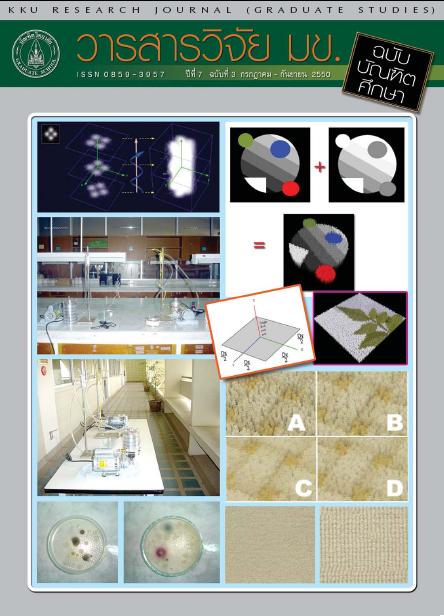The Development of Critical Thinking Teaching Skills of the Elementary School Science Teachers(การพัฒนาทักษะการสอนคิดอย่างมีวิจารณญาณ ของครูวิทยาศาสตร์ประถมศึกษา)
Keywords:
Critical thinking(การคิดอย่างมีวิจารณญาณ), Critical thinking teaching(การสอนคิดอย่างมีวิจารณญาณ), The elementary school science teachers(ครูวิทยาศาสตร์ประถมศึกษา)Abstract
การวิจัยครั้งนี้มีวัตถุประสงค์เพื่อพัฒนารูปแบบการพัฒนาทักษะการสอนคิดอย่างมีวิจารณญาณของครูวิทยาศาสตร์ประถมศึกษา และศึกษาประสิทธิผลของรูปแบบ การวิจัยแบ่งออกเป็น 3 ระยะคือ ระยะที่ 1 ศึกษาบริบท สภาพปัจจุบัน ปัญหาและความต้องการด้านการจัดการเรียนรู้เพื่อพัฒนาการคิดอย่างมีวิจารณญาณ ระยะที่ 2 การพัฒนารูปแบบการพัฒนาทักษะการสอนคิดอย่างมีวิจารณญาณ ระยะที่ 3 การประเมินประสิทธิผลของรูปแบบ กลุ่มเป้าหมายเป็นครูผู้สอนวิทยาศาสตร์ประถมศึกษา จำนวน 50 คน เก็บรวบรวมข้อมูลโดยใช้แบบวัดการคิดอย่างมีวิจารณญาณของครูผู้เข้ารับการฝึกอบรมก่อนและหลังการอบรม และประเมินแผนการจัดการเรียนรู้ที่เน้นการคิดอย่างมีวิจารณญาณของครูผู้เข้ารับการฝึกอบรม ผลการวิจัยพบว่า 1) สภาพปัจจุบันครูมีสภาพการจัดการเรียนรู้เพื่อพัฒนาการคิดอย่างมีวิจารณญาณของนักเรียนอยู่ในระดับค่อนข้างน้อย และครูมีความต้องการพัฒนาตนเองเกี่ยวกับการจัดการเรียนรู้เพื่อพัฒนาการคิดอย่างมีวิจารณญาณของนักเรียนอยู่ในระดับมาก 2) รูปแบบการพัฒนาทักษะการสอนคิดอย่างมีวิจารณญาณมุ่งพัฒนาครู 3 ด้าน คือ ด้านความรู้พื้นฐานเกี่ยวกับการคิดอย่างมีวิจารณญาณ การฝึกกระบวนการคิดอย่างมีวิจารณญาณของครูผู้สอน และการสอนคิดอย่างมีวิจารณญาณ โดยมีขั้นตอนการพัฒนา 6 ขั้น คือ การเตรียมความพร้อม เสนอสถานการณ์ปัญหา ฝึกการคิดเป็นรายบุคคล ฝึกการคิดเป็นกลุ่มย่อย การนำเสนอและอภิปรายผลการคิด และประเมินกระบวนการคิด 3) ครูผู้เข้ารับการฝึกอบรมตามรูปแบบดังกล่าวมีคะแนนเฉลี่ยการคิดอย่างมีวิจารณญาณหลังการอบรมสูงกว่า ก่อนอบรมอย่างมีนัยสำคัญทางสถิติที่ระดับ .01 และ 4) ครูผู้สอนสามารถจัดทำแผนการจัดการเรียนรู้ที่เน้นการคิด อย่างมีวิจารณญาณได้ระดับคุณภาพดีมาก จำนวน 29 คน และระดับดี จำนวน 21 คน
The purposes of this research were to construct a model to develop critical thinking teaching skills of science teachers in the elementary schools and to study the effectiveness of the model. The research was conducted in three phases. The first phase is contextual study, the conditions and needs of learning to develop critical thinking ability. The second phase was to construct a model to develop critical thinking teaching skills. The third phase was an evaluation of the efficiency of the model. The target group consisted of fifty science teachers in the elementary schools using one group pretest-posttest design. The data were collected by critical thinking test and evaluation learning plan emphasizing critical thinking of science teachers in the elementary schools. The research findings were 1) The present condition of teachersû earning condition for developing studentsû critical thinking was at the rather low level and the needs of self developing in learning for developing studentsû critical thinking was at the high level. 2) The model to develop critical thinking teaching skills was aimed to develop the basic knowledge of critical thinking, to train critical thinking process and critical thinking teaching approach. The development consisted of six steps; to get ready, to present the problems, to train individual thinking, to train sub group thinking, to present and discuss thinking results, and to evaluate thinking process. 3) The effect of the model indicated that science teachers gained significantly higher scores than the pretest at the .01 level. 4) twenty-nine science teachers were able to construct learning plans emphasizing critical thinking in a çvery goodé level, while the remaining twenty-one were able to construct a çgoodé level.



